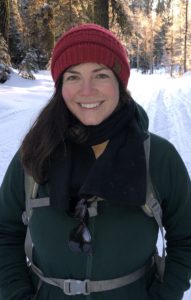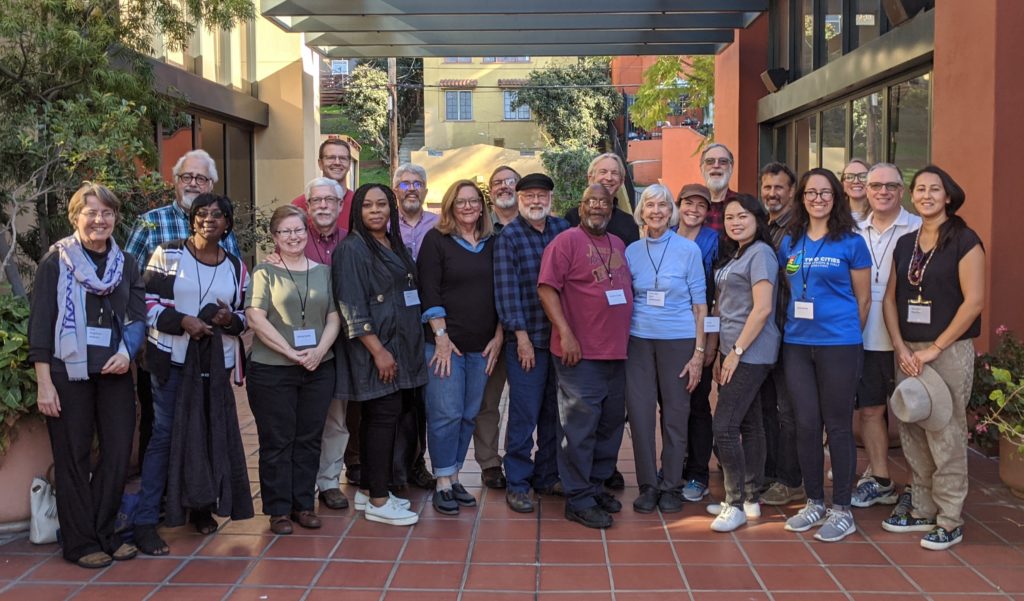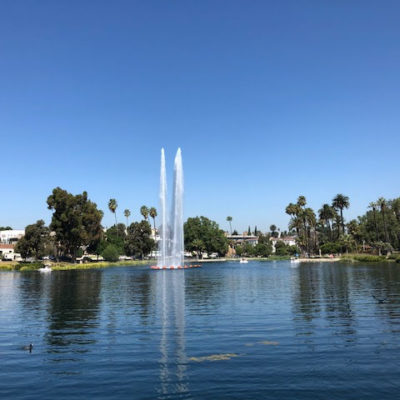
by Katerina Friesen
“I’m beginning to wonder, is the gospel that we’ve preached too small?” one of the church leaders pondered at a recent climate retreat entitled, “Who Cares about Climate Change: Pastoral Response to Denial and Despair.”
The first weekend in February 2020, 28 California Anabaptist pastors and church leaders gathered to broaden our understanding of the church’s witness to include a response to climate change. Doug Kaufman, director of pastoral ecology with the Center for Sustainable Climate Solutions, led the event, which took place in in Echo Park Lake, Los Angeles,.
It was a diverse group. Representatives from Mennonite Brethren and MCUSA congregations were present, including immigrant church leaders from the Congo, Nigeria, Indonesia, South Korea and Belize. This was the first retreat of its kind held in an urban setting. Sessions included learning about the impacts of climate change and resulting sea level rise on the Los Angeles region where we gathered.
 I attended the retreat along with Sara Gurulé, a young leader from Wild Church, a church I’m planting and tending in Fresno, CA. We led three outdoor contemplative worship times that incorporated liturgies of praise, lament, and active hope as part of the New Creation God is bringing about in Christ. We broadened our worship to join in the praise and lament of the L.A. watershed where we worshipped, along with elements of the City of Angels. These included the paved-over L.A. River, Canadian geese in Echo Park Lake, the San Gabriel mountains and the urban garden where we met for worship.
I attended the retreat along with Sara Gurulé, a young leader from Wild Church, a church I’m planting and tending in Fresno, CA. We led three outdoor contemplative worship times that incorporated liturgies of praise, lament, and active hope as part of the New Creation God is bringing about in Christ. We broadened our worship to join in the praise and lament of the L.A. watershed where we worshipped, along with elements of the City of Angels. These included the paved-over L.A. River, Canadian geese in Echo Park Lake, the San Gabriel mountains and the urban garden where we met for worship.
Denver Locke of Family Mennonite Church shared one of the barriers he experiences when it comes to talking about climate change.
“At church, we talk about the Spirit! We don’t talk about things like climate change. That’s the world… we’re supposed to be ‘in the world, but not of the world,’” he said. The Spirit/world divide is a major block for many congregations in engaging politically and ecologically, and so I felt encouraged to see how this retreat engaged pastors and leaders through worship, Bible study, and theology in order to bridge this divide.
Doug Kaufman led most of the sessions, along with Mark McReynolds and Deb Shepherd-Webster, two scientists and church leaders from the L.A. area. We considered research on the emotions surrounding climate denial, including “psychic numbing” and the refusal to act despite knowing the extent of the problem.
Other sessions reflected on Biblical and theological resources for caring about climate change and drew from passages from Isaiah, John 1, Hebrews 1 and Colossians 1. One of the sessions focused on climate justice and included participant sharing about emerging nonviolent movements such as the Sunrise Movement and Extinction Rebellion. Both of these highlight the planetary emergency that we’re in as a result of limitless growth capitalism.
We also heard stories from the Global South about how climate change is intensifying global inequalities, such as in sub-Saharan Africa where communities are suffering as a result of unpredictable rainfall and food and water shortages.
At the end of our time together, participants shared our next steps and commitments. These included preaching more often about climate change and creation care, creating liturgies that incorporate God’s care for all creation, sharing ecologically-friendly practices as congregations, putting up solar panels as part of a church’s witness, and doing a climate activism training in collaboration with other churches.
I found the opportunity to talk and think with others about the heavy theme of climate change to be surprisingly life-giving. Facing the realities of climate chaos can feel isolating, overwhelming, and depressing, and yet when shared with community, space for faithful action opens up. Lynn Park-Hur, the youngest person present, summed up some of the longing for community she feels among her high school peers.
“A lot of people in my generation are really lonely and isolated… it’s hard to find a literal place of community since a lot is online these days. We don’t know how to do community and talk about climate change at the same time,” she said. She shared that the church can provide this space with and for young people if we are able to connect issues of climate change with faith.
Bill McKibben (founder of 350.org and a Methodist Sunday School teacher) once said, “Climate change is an opportunity for which the church was born.” This re-framing of climate change from denial and despair to a call to deepened discipleship was at the heart of our retreat. I left the retreat wrestling with the meaning of the word “hope” as different than optimism that things will get better. At the same time, I felt a resurgence of hope that the church can witness to the broader gospel of God’s love in Christ for the whole earth in the midst of climate change.
Note: For further learning, see MCUSA’s Learn Pray Join series on climate justice, including a free webinar on Feb. 27th at 7:30 p.m. ET called “Caring for Climate: Beyond Denial and Despair.”
Katerina Friesen lives on traditional Yokuts land in Fresno, Calif., and works with the Insight Garden Program, an in-prison rehabilitation program that uses gardening to reconnect incarcerated people with themselves, their communities, and the natural world. Katerina is also an adjunct instructor at Fresno Pacific University and offers pastoral leadership to Wild Church. She has an M.Div. from Anabaptist Mennonite Biblical Seminary.
